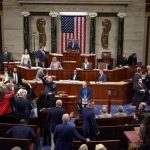With Brexit causing mass loss of confidence in Government, damage limitation begins (with the outright solution never mentioned)
The Daily Express commissioned a ComRes opinion poll that was conducted on January 14th and 15th, and the results could be interpreted, loosely, in the following way: while everyone thinks that Brexit has revealed that British Government institutions are in need of an “overhaul”, the excrement produced by the Queen doesn’t stink. Hence we should understand the poll to be bogus: an exercise in managing perception (which is what opinion polls are for) and managing expectations. For it is certainly true that people are sensing that the relationship between themselves and British Government is not what they had been led to believe it was; i.e. the ruling class has an agenda, the Government is the means to pursue it, and the electorate only imagines that its bidding, expressed in countless elections and other democratic exercises, is what the Government does. As such, British Government is not so much in need of a overhaul, but an entire strata of imposturing and predatory fraudsters need to be disempowered and even jailed – and because of this, in order to preserve the status quo, the British people evidently must be made to understand that there are limitations to reform, and get hoodwinked into believing that superficial change constitutes an improvement, when actually it is no such thing.
An emblem of that which is untouchable, of course, is the Queen who, remarkably (evidently there are things that could be done to prevent attempts to stop Brexit), does not emerge from the mass occurrence of scales-falling-from-eyes caused by Brexit with a tarnished image, while on the other hand, with 79% of people disagreeing with the statement that the institution was emerging from the Brexit process in a good light, “parliament is at risk of losing the public’s trust completely”. With a no-go area thus neatly cordoned off, the questions put to the poll respondents would basically constitute the extent of the changes that the Establishment would permit without endangering itself; if they are popular ideas for change, it matters not if these controlled options are then published in the Express for people to rally behind (and chase their tails trying to get implemented), because they are essentially worthless.
The first possibility offered for reform is to reduce the number of MPs from 650 to 600; 54% agree with this fat lot of good. The fraud to be maintained here is that there must be MPs in Parliament for the country to function: this is not true; although Parliament calls itself sovereign, it does not have an inherent right to exist, and there can be zero MPs if the people so desire it. In fact, the ideal situation would be one in which Parliament only sits when decisions need to be taken about national interests in the international sphere. Of course, a reduction of all 650 MPs would not be put to people to respond to in a poll, because that would be seeding the idea of an unwanted development for the ruling class.
62% of poll respondents welcomed more decisions made at local level – which is another way of saying “devolved government”, meaning yet another layer of it. “Devolved” means power vested from the established higher authority, and “localism”, as it was fashionable to call it when Hannan and Carswell were manipulating expectations ahead of direct EU control of councils, is a deception. The only sort of local government worth having is that in which control comes from the grassroots upwards: not what the British Government has in mind. More about this later.
77% of respondents want a written US-style constitution – which is another red herring. The entirety of the law boils down to an individual’s right to self-defence; when such essentials get enshrined on paper, then because they are in print, and text is alterable, people begin to think that they can make modifications. The good of a constitution is to set out the specific limitations of government – and the British Establishment doesn’t have that in mind. Moreover, the danger of a written constitution is that it legitimises a layer of fiction that overlays and therefore alters the fundamental scheme of law. It has been the intention of the British Government for some time now to introduce a written British Constitution for this purpose; a significant threat resides, for instance, in the defining of human rights in ways that undermine proper civil liberties. In fact, the US Constitution itself was of the same ilk. At the bottom of the page are audio files containing a talk (in two parts) given by William Cooper about the jurisdiction of the US Federal Government (sometimes reading from a book by Lowell “Larry” Becraft). In it he talks about the representatives at the Conference of the States exceeding their authority (from the states) to create the union. They were supposed to be meeting to refine the articles of confederation.
43% of poll respondents (with 27% against) want national referenda – but it’s not made clear in the Express coverage what sort of decisions these would be used to make. Also, these were only desirable if they were made legally binding. This response is astonishing as one supposedly generated by the “mess” of Brexit – which is showing that national government will try not to honour a legally binding referendum if it doesn’t like the result.
52% of poll respondents want proportional representation in national elections. This is easily dealt with: what difference does it make when all MPs are puppeteered by a cabal that didn’t have to get elected?
44% want the House of Lords replaced with an elected senate. How about replacement with nothing? The answer is never more government.
None of this gets to the root cause of the criminal misgovernment that people can sense, and want to put an end to; none of this even begins to identify the real problem, which is the fact that the City of London poses as the Crown, which was abolished a long time ago and replaced by the Commonwealth. The overhaul that is required is the restoration of the Commonwealth, and that is why the Queen, who is a front for the City, must be seen to be inevitable.
When one listens to the abovementioned William Cooper talk, one realises that the hoax of rule by Washington DC must have been modelled on the hoax of rule by London. The Federal government has jurisdiction over its own assets, its land, buildings, and personnel; nominally, it was concerned with a unified military identity for the individual states collectively. As such, it expanded into the states by purchase and when the states ceded territory for Federal installations. And so the nature of Federal Government can very basically be put like this: it is a service provider, and acquires its power by having states and individuals volunteer into being subjects in return for the service – at which point it becomes legal government. The City of London is the Corporation of London, historically this would be people in old London who owned business and property thereabouts, and hence were liable to sit on the local government – there were corporations like this in every town. London’s had the advantage of being in close proximity to the seat of national government. The article about how General Monck of the Parliamentarian Army and the City of London came to a deal to allow the way clear for the “restoration” of the King is long overdue at FBEL, but basically, the City literally bought an opportunity to rule the Commonwealth by posing as the restored Crown, or more precisely, the power dynamic between King and Parliament. But there is and was no restored Crown: just a situation that appeared to the English of the time to be the same as the old order when they were ruled by the King of England, with taxed subjects restricting their liability, and the King’s ambitions, through a parliament. The old order had been legitimate, thus the new order, which looked a lot like it, must be legitimate, right? No, because the Civil War created a situation where the republic was sovereign, and parliament only an expression of the republic. And there was something else that was very different upon the “restoration” of the Crown: private militaries were banned. Only the Crown could field an armed force. The Crown would provide the nation’s army, and its militia (to put down violent opposition from crowds that couldn’t be called armies). One thinks of Congress and its skeleton key to unlock the doors of power. Another similarity that we might expect to find if one looked for it in the legal definitions would be this: just as the US Constitution did not supercede the already existing articles of confederation, the Crown most likely does not supercede the Commonwealth (whereas the latter definitely replaced the former). And yet it is through the Crown that the City rules at astonishing distances beyond its jurisdiction. An article appeared at FBEL very recently about the gathering up of national jurisdiction over the Crown Courts into the City of London. Of course, everyone knows about the Bank of England – founded 1694 (so, post-restoration of the King), and given control of the nation’s coffers upon delivery.
To demonstrate City primacy, much is made of the remembrancer, of whom George Monbiot writes about in a 2011 Guardian article (it was the time of the Occupy movement, and there was some mainstream interest in revealing as much about the City as would, presumably, affect an audience to a desired end):
The City of London is the only part of Britain over which parliament has no authority. In one respect at least the Corporation acts as the superior body: it imposes on the House of Commons a figure called the remembrancer: an official lobbyist who sits behind the Speaker’s chair and ensures that, whatever our elected representatives might think, the City’s rights and privileges are protected.
However, the City apparently had a remembrancer in parliament a long time before the Civil War; one remains to this day, presumably, merely for the sake of appearances: to aid in giving that abovementioned impression of nothing having been changed at the restoration of the King, because the City doesn’t have to lobby the legislative body administering England if it is in fact controlling it.
In actual fact, the Monbiot article provides a good starting point to understanding how the City is atop a Masonic network through which control is leveraged:
There are four layers of elected representatives in the Corporation: common councilmen, aldermen, sheriffs and the Lord Mayor. To qualify for any of these offices, you must be a freeman of the City of London. To become a freeman you must be approved by the aldermen. You’re most likely to qualify if you belong to one of the City livery companies: medieval guilds such as the worshipful company of costermongers, cutpurses and safecrackers. To become a sheriff, you must be elected from among the aldermen by the Livery. How do you join a livery company? Don’t even ask.
The knowledge of, and for rule by technocracy, more pertinently described as “knowledge of the tipped scale”, “stacked deck” or the “unlevel playing field”, having passed from the near east into the West through contacts made by the likes of the Templars (protection racket gangsters, and then financiers, who came into London) were guarded in the artisans guilds, with each expressing the concepts in symbols of their trade. The masons were one such group, and came to represent the entire secret order (secret because Kings and Popes were jealous of their own wealth and power). Uniquely, London’s guilds and their overt connection with government survive down to our generation. “How do you join a livery company?” There can be no mystery; one is most likely invited by another lodge member. And there is no mystery about Masonry either: it is pure gangsterism.
But ruling an entire country is not just about making legislation that favours the party ultimately legislating – although a lot of that goes on, of course. Showing favouritism too obviously, and being impartial all the way into overt tyranny, doesn’t keep the ship of state on a steady course. The objective is to milk the cash-cow, not have it kick the bucket over. What is required, therefore, is people in the legal system (and its enforcement arm) and local government who interpret and prosecute legislation selectively, so that the “laws” look fair on the books, but are far from it in practice (this truth, no matter how well concealed it may be, is potentially never too far away for people to discover by their own experience – see here). In turn, people with money pay off this network to ensure that they do not fall foul of it. In return, a contract can be awarded here, and a blind eye can be turned to a criminal offense there. This is why FBEL tells its readers that if they want to know who to blame for the ills of their country, go to the local Masonic lodge, and look at who is coming in and out.
The solution that will never get offered as an option in any opinion poll like the one that is the subject of this piece is the rightful republic; a republic that starts and ends in local people self-organised into representative bodies, with powers conferred upon them, by dint of being of the people, to protect those in their jurisdiction from the abuses of the national government (i.e. the City and its vast old boy network, which is a fraud and its enormous racket) and that jointly, with other suchlike provincial bodies, exert control over – even to the point of disbanding it – any central government which may be necessary for collective purposes. Back to the United States: by merely not recognising the authority of the British Government is how the thirteen colonies became independent. Later, a lot of the English colonists didn’t like the new Congress which looked to them like a straight replacement for London – and it serves to remind that even the most radical of overhauls to the government of men is at risk of being hijacked by the unscrupulous – or the old boy network: the Founding Fathers, or the most of them anyway, were Masons.
W. Cooper, Conference 98, Federal Jurisdiction, parts one and two:


















